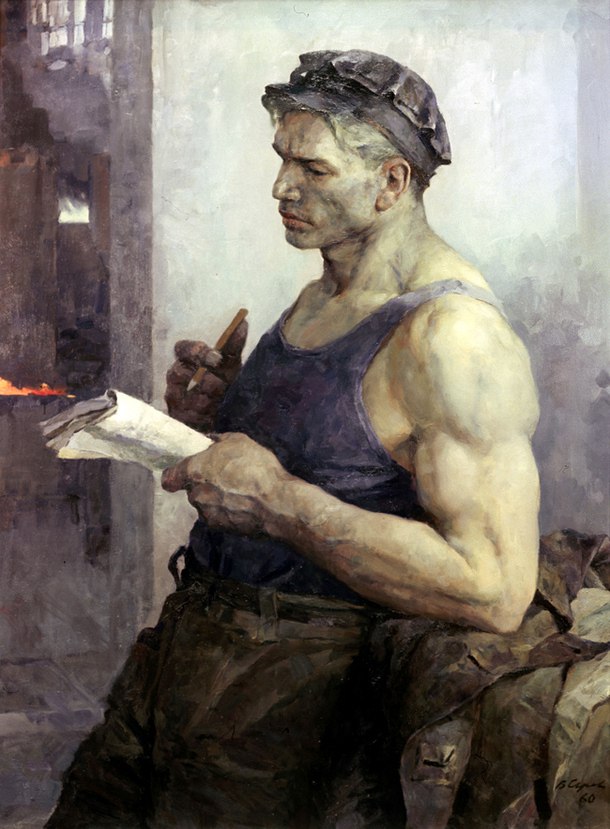My history teacher says “geography is destiny” and made us watch guns germs and steel. I think bad empanada said this narrative promotes a lack of remorse for colonization because it’s characterized as inevitable. He didn’t explain why it was wrong though iirc. My teacher (who likes orwell) says it’s just material conditions. It could be argued that geography is created the original conditions that led to class society before class forced largely took over, though this could be taken to the extent of class being secondary. Anyone know about this?
There is a classic quote I usually refer to when someone asks this question regarding Geographical Determinism.
It is from Stalin’s 1938 Dialectical and Historical Materialism itself:
There can be no doubt that the concept “conditions of material life of society” includes, first of all, nature which surrounds society, geographical environment, which is one of the indispensable and constant conditions of material life of society and which, of course, influences the development of society. What role does geographical environment play in the development of society? Is geographical environment the chief force determining the physiognomy of society, the character of the social system of man, the transition from one system to another, or isn’t it?
Historical materialism answers this question in the negative.
Geographical environment is unquestionably one of the constant and indispensable conditions of development of society and, of course, influences the development of society, accelerates or removed its development. But its influence is not the determining influence, inasmuch as the changes and development of society proceed at an incomparably faster rate than the changes and development of geographical environment. in the space of 3000 years three different social systems have been successively superseded in Europe: the primitive communal system, the slave system and the feudal system. In the eastern part of Europe, in the U.S.S.R., even four social systems have been superseded. Yet during this period geographical conditions in Europe have either not changed at all, or have changed so slightly that geography takes no note of them. And that is quite natural. Changes in geographical environment of any importance require millions of years, whereas a few hundred or a couple of thousand years are enough for even very important changes in the system of human society.
It follows from this that geographical environment cannot be the chief cause, the determining cause of social development; for that which remains almost unchanged in the course of tens of thousands of years cannot be the chief cause of development of that which undergoes fundamental changes in the course of a few hundred years
In the academic discipline of Geography, this sort of inevitable determinism, has been rejected since about the 1950s for both it’s colonial assertions, but also it’s patently inaccurate claims. No serious social scientist of any background would take the claims of geographical determinism at face value.
If you would like to entertain a more serious and dialectical understanding of Geography and it’s relation to class society, I would recommend a A Theory of Imperialism (2017) by Patnaik and Patnaik. There has also been numerous other works dealing with Uneven (and Combined) Development within an urban, urban-rural, and of course, international contexts aswell.
Hell, if anything, Marxism’s pre-occupation with the peasant question and primitive accumulation IS already a valuable theoretical and practical contribution to understanding the role of Geography in society. And unlike the vulgar geographical determinism of the Eurocentrists in which colonialism becomes a self-fulfilling prophecy, Marxism has always been a few steps ahead of conventional western science in that regard.
Lmao you beat me to it, literlly was about to pull out that paragraph.
I read that before, but forgot. I think the response would be that geography facilitated the interactions between old world societies leading to them being extra “advanced,” having the technology (guns, germs, steel, horses) to conquer others. Not that it caused every minute change.
Just walk into your next class an loudly proclaim “STALIN SAID THAT YOU ARE WRONG!” then refuse to elaborate and leave. You will soon find that your body will slowly transform into that of Arnold Schwarzenegger for you are now a sigma.
for that which remains almost unchanged in the course of tens of thousands of years
If only Stalin knew about global warming 😔
One thing to consider is the Eurocentrism of what it means to be “advanced” in these contexts. When Europeans invaded and colonized the Americas, yes they had many material advantages, but something key to consider is the cultures and humanity and decisions made and how they differed between cultures in Europe and the Americas. Europeans were vicious and condescending, rapidly transitioning from curiosity and trade to plunder and murder and ethnic cleansing. The fate of the indigenous people of Hispaniola, for example. In contrast, there were rich cultures across the Americas with wide diversities of thought and philosophies, none of which compared to the barbarity of Europeans (even the supporters of regional empires in the Americas couldn’t hold a candle to the salting of the earth depravity of Euros).
I’m pointing at all of this because the common Euro narratives are imbued with a social darwinism that conflates conquering and violence with success and superiority. They then go a step farther to absolve themselves of blame for developing cultures so barbaric, pointing at things like you mentioned, including geography. While on one hand material conditions are extremely important and explain a lot, they should not allow us to cease a political or philosophical or cultural critique, nor to accept simplistic and vulgar analysis of material explanations. The colonial mindset that genocided continents persists in its evolved form of imperialism of the US-led capitalist order.
The barbarity of Euro colonizer cultures lingers, which is a reason they avoid drawing attention to the continuity of capitalism and ethnic cleansing over these hundreds of years. They’d be forced to take a position against empire, to make statements that suggest a need to change the current order. Instead, they safely leave the material in the past, implicitly supporting the status quo.
The argument that is sometimes made is that the only real signifier of how advanced a civilization is, is their ability to destroy or subjugate everyone else. This view holds that any other kind of societal advancement is not real because it can be nullified by someone with more military power. It doesn’t matter how great your architecture is, how efficient your irrigation, how egalitarian your socio-political system, or how pretty your art is because all of that can be wiped out by a more powerful invader. Unless you can defend your advancements, they may as well not have existed at all. And it is usually implied that the only way to defend your own civilization is by destroying or subjugating all the others around you, because if you don’t do it to them they will eventually do it to you. The same people that hold this view usually also believe that all real societal progress is a byproduct of advancements in military prowess.
Unfortunately i don’t think you can really reason with people who think like this, they just have a radically different set of fundamental values that is incompatible with our views on society.
Radically different is right! I’ve heard this argument before. I may even have been persuaded by it until I was about 20. But jfc does it not sound like the most backwards society imaginable? So advanced that it isn’t capable of making technological advances on its own. And when we add class back in to see that the ruling classes orchestrating all this are applying the same principles of theft and brutality to the working classes in order to advance militarily or even have a military. Did anyone say parasite?
“Geography is Destiny” mfs when I tell them that Eurofucks had to rely on stealing resources from the Global South to as much as get a taste of being advanced technologically and in higher standards of living to the point where they no longer had to rely on plundering one another like they always did for thousands of years:
The ones we’re made to watch basically say “all the technology came from the Fertile Crescent, but Europe perfected it.”
I don’t think the idea itself is wrong but calling it “destiny” is hyperbole. Geography is definitely a real material factor that has an impact on how societies develop and on the interactions they have with other societies. It’s a part of the overall environment and a constraint that humans like any other species have had to adapt to over the course of our development. It’s a long time since i read Guns, Germs and Steel and i would have to revisit it to offer more substantive critique, but as with most literature of this kind that is written by Western authors for Western audiences there is always some amount of Eurocentrism there which skews the point of view leading to post-hoc justifications for why certain things had to happen.
It sounds like a vulgar materialism.
True
What no historical materialism does to a mf
The concept of class is fluid and is continuously being redefined. Slaves and masters, kings and serfs, etc.
But what is a constant is that we always strive towards equality, and that struggle will always lead us to develop new modes of production.
Capitalism was just the result of attempts to develop away from monarchism; to make capital and the holders of capital to be king, rather than a lineage.
It’s got nothing to do with the resources of an area. If it did, Australian aborigines would be the dominant superpower, as they had the most uranium.
The concept of class is fluid and is continuously being redefined.
Isn’t it just relation to means of production? There’s a colloquial or idealist definition, but for the study of history the Marxist one works.
But what is a constant is that we always strive towards equality,
Not really, many things in history have turned towards inequality. Or do you mean that is our task as communists? If so, equality was never our goal, Marx clears this up in the manifesto.
It’s got nothing to do with the resources of an area. If it did, Australian aborigines would be the dominant superpower, as they had the most uranium.
That doesn’t make sense though, even by vulgar materialist logic. You need to develop the technology before that to use uranium. The determinists argue that Europe was able to colonize because they got language, metalworking, and animals from nearby because other civilizations had similar climates and could share technology. They refined those. Meanwhile the “new world” was more geographically split with a lack of civilizations with similar climates to interact with, or productive animals to farm.
That is true to the modern period. But if you owned a farm or company in the medieval period, you’re still a subject of the monarchy. The rule of law and the separation of church and state was a very new concept back then.
The concept of equality is what motivates the masses. It’s something that people can be sold on, and has been sold on.
On the small scale, things have turned unequal occasionally. But on the grand scale, looking at how civilization has progressed, we can see that classes are becoming more and more equal in terms of power and privilege. This is why we can extrapolate communism and the dissolution of class to be where human society is headed.
I was kidding in that last part
But if you owned a farm or company in the medieval period, you’re still a subject of the monarchy.
You would be bourgeois, not a lord.
On the small scale, things have turned unequal occasionally. But on the grand scale, looking at how civilization has progressed, we can see that classes are becoming more and more equal in terms of power and privilege.
I see a trend with the productive forces and accessibility of being ruling class, but there seems to be even more inequality than before. Idk if it’s a valuable concept, it’s common for liberals to proclaim.
I was kidding in that last part
Maybe, but I prefer my logical extensions to be accurate based on someone’s real logic, even if absurd or funny.
The bourge used to be a kind of ‘middle class’. They had better material conditions, but didn’t have the same rights as lords to influence policy. Nowadays, with bourgeois democracy, they can just lobby for their interests.
Going from a slave hierarchy to a feudal system to capitalism is becoming more equal. People tend to fight for their rights, and that’s the driving force. I believe it is a very valuable concept, but not for the same reason liberals think it is. Libs think that because of this, capitalism is the most equal we’ve had in history and this trend will stop here. I think that this trend will continue if people can break the illusion of realism and keep fighting.
You still haven’t argued that the definition of class is fluid.
Capitalism may not have rulers ordained by god, but it does have people far richer than any feudal king.
I’ll jump in here if you don’t mind. I think by ‘fluid’ Ronin is referring to the fact that dialectics is the study of change and relations and that every relation is constantly changing. In that sense, everything is historically contingent i.e. fluid. Although the relative fluidity of e.g. mountains or planets is something else and not always the most useful descriptor.
I read the comment as meaning that class is fluid in the sense that it changes with developments in the mode (and means) of production, relations to nature, and mental conceptions.
Class is also fluid in the sense that anyone’s class can change alongside their own relation to the means of production.
As for being redefined, it depends on how generous of an interpretation you give the phrase. It could mean ‘class now refers to working class/middle class/upper class and the ability to buy avocados’. But I would give it a more favourable reading in light of the first half of the sentence.
I read it as putting emphasis on the fluidity as opposed to the static way that bourgeois treat class. Not ‘redefined’ in the sense that class-as-concept is redefined. But in the sense that the ‘ruling’ class was once feudal lords and is now the haute bourgeois, and the working class was once peasants, slaves, and a handful of proles and is now mostly proles, a handful of peasants, far too many slaves, and far too many labour aristocrats. And, in addition, the way that even Marxists have refined their class categories to explain differences between the global south and north. This is all redefinitional and Marxist.
I also think Ronin is right about equality. It’s a useful way of insisting on class struggle. Yes, there’s a liberal way of interpreting the claim, but I get a different conclusion with a more favourable reading, assuming a Marxist intent. Class hierarchy and composition has changed because a ruled class has organised to take power from a ruling class. That seems like equality is a driving force to me. We just haven’t completed the development, yet, which is where socialists and communists come in.
I agree with all that, I just think saying the “concept” is fluid is a poor choice of words that suggests idealism.
Geographic Determinism overstates the role of geographic conditions in the development of society (though I think some people in the thread are making it out to be worse than it is).
Dialectics are a useful framework for dissecting this problem. Geography does play a part in the development of human societies, but it is not the only part - there is also the world of ideas, individual people and events, and pure random chance.
Geographic Determinism is almost the most extreme form of Historical Materialism - that material conditions are the absolute driver of societal development. This debate is useful in that it shows us Historical Materialism is not absolute - that the actions of individual people and groups, movements and inventions, do matter - even if the material conditions and class interests are always the more important factor.
The “absolution of guilt” part is trickier. Marxism is not a moralistic ideology. If anything, GG&S hews more to the Marxist orthodoxy than many people in this thread. Marxism presumes that classes will always tend to act in their own class interests - that it is natural for the oppressor to oppress, and that it is up to the lower classes to secure their own power. White people were never going to feel guilty about colonialism - it is in their class interests to apologize for themselves in whatever small way they can to ease their conscience. To expect them to do otherwise is un-Marxist; it is un-Marxist to expect the upper classes to change society for you, instead of the oppressed class changing society proactively.
Building up on Neptium comment, different geographical conditions lead to different variables but it is not the chief determinant force in development.
In Engels book on the origin of private property and the state it is mentioned how the “old world” had an advantage over america, it had almost all of the domesticable animals. This lead to the development of animal husbandry and a very easy and plentiful source of food. In contrast, america had to develop agriculture to produce more food since it had only the turkey and the llamas. The civilizations in america had a much better understanding of farming than in the old world, even tho they lacked in the tools department.
Another fun fact is how much more developed hygiene was in america.
In contrast, america had to develop agriculture to produce more food since it had only the turkey and the llamas.
Yes, that’s what they say.
Another fun fact is how much more developed hygiene was in america.
Yeah, that’s probably part of why they spread so much disease so fast.
Not really, disease came more from domesticated animals, since a lot of the deadliest diseases known to man and the Old World came from zoonotic sources, or were spread through insects and animals such as fleas, ticks, mice, rats, or birds.
I know, so domesticated animals countributed doubly to colonization.
Not on its own, though. The colonisers had to look at the damage caused and think, ‘Now would be a good time to take advantage of a weakened enemy’.
Regarding “Guns Germs and Steel” specifically, that book (and its supporters) are so hated among historians that it’s on multiple FAQs on reddit’s r/askhistorians. Here’s what I think is the best comment on that. This one is also very complete.
Basically the entire thesis of the book hinges on a revisionist and white pop history version of colonialism, in which Europeans landed and left some disease, then later came back and won decisive military victories against the now scattered and weak indigenous peoples, who could barely fight back. In fact the “death by disease” largely happened after forced resettlements, slavery and concentration camps, and the genocides throughout both north and south America were not quick affairs, but were concerted efforts up to at least the mid-19th century, if not today.
This is a common theme with vulgar materialists, once they’ve decided on what factors will have inevitably generated the results that happened, all nuance of the facts is thrown out of the window if it disagrees with their historical formulae. They have to disregard all technological and cultural advancements of the people who lost, as well as their adaptability to new circumstances or the near-losses of the victors in order to portray history as inevitable.
This article is also a pretty good introduction to that whole history in the USA.
I wrote out a long comment and deleted it, might come back to this, but check out world systems & dependency theory guys.
I really really recommend Eurocentrism (2nd edition) by Samir Amin
I forgot Diamond was trying to explain why the west has all the “loot.” Obviously, dependency theory makes way more sense. I was just wondering about the geographical explanations for why colonization worked. It’s clear he’s wrong in both.
Samir Amin’s got some good writing abt the lack of capital controls of European feudalism & why that + the need to monopolize certain natural resources led to imperialism













